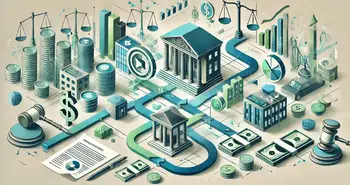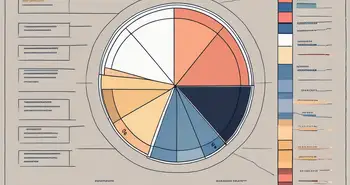What Is Inflation, and How Does It Impact Your Finances?

Inflation is a term that you often hear economists and financial experts throw around, but what exactly does it mean for your finances? In simple terms, inflation refers to the general increase in prices of goods and services over time. But its impact on your personal finances goes far beyond just the rising cost of your favorite latte or that new gadget you've been eyeing. In this article, we'll delve into the concept of inflation, explore its relationship with the economy, and discuss strategies to protect your finances from its adverse effects.
Understanding the Concept of Inflation
Before we dive into the impact of inflation on your finances, it's important to grasp the basic definition of inflation. Inflation is measured by the Consumer Price Index (CPI), which calculates the average price change of a basket of goods and services over time. When the CPI rises, it means that prices are increasing, and as a result, the purchasing power of your money decreases.
But why does inflation occur in the first place? The causes of inflation are multi-faceted and often interrelated. One of the primary drivers of inflation is excessive demand relative to supply. When there is too much money chasing after too few goods and services, prices naturally rise. This can happen when the economy is growing rapidly, and consumers have more disposable income to spend. As a result, businesses increase their prices to meet the increased demand.
Another factor that contributes to inflation is changes in production costs. When the cost of raw materials, labor, or other inputs increases, businesses may pass on these higher costs to consumers in the form of higher prices. For example, if the price of oil rises, it can lead to higher transportation costs, which can then result in higher prices for goods and services.
Government policies can also play a role in inflation. For instance, if a government increases its spending without raising taxes or borrowing, it can inject more money into the economy. This increase in the money supply can lead to inflation. Similarly, changes in tax policies or regulations can affect the cost of doing business, which can then impact prices.
Global economic conditions can also influence inflation. For example, if there is a global increase in the price of a particular commodity, such as wheat or oil, it can lead to higher prices for related products around the world. Additionally, fluctuations in exchange rates can impact the cost of imported goods, which can then affect domestic prices.
It's also worth noting that inflation can take different forms. Some types of inflation, such as demand-pull inflation and cost-push inflation, are driven by specific factors. Demand-pull inflation occurs when there is excessive demand for goods and services, leading to upward pressure on prices. Cost-push inflation, on the other hand, happens when there is an increase in production costs, which then leads to higher prices.
Other types of inflation, like hyperinflation and stagflation, may occur under unique circumstances. Hyperinflation is an extreme form of inflation characterized by rapid and out-of-control price increases. This can happen when a country's currency loses its value due to factors such as excessive money printing or political instability. Stagflation, on the other hand, is a combination of stagnant economic growth and high inflation. It can be a challenging situation for policymakers to address, as traditional measures to stimulate the economy may exacerbate inflation.
The Relationship Between Inflation and the Economy
Inflation is not just a random occurrence; it has a profound impact on the overall economy. One of the key relationships to understand is how inflation affects economic growth. While a moderate level of inflation is generally considered healthy for the economy, high inflation can hinder economic expansion. When prices rise rapidly, consumers become hesitant to spend, and businesses may postpone investments, resulting in a slowdown in economic activity.
However, the impact of inflation on economic growth is not always straightforward. It is important to consider the underlying causes of inflation. If inflation is driven by increased demand for goods and services, it can be a sign of a growing economy. In this case, businesses may respond by increasing production and hiring more workers, leading to economic growth. On the other hand, if inflation is caused by supply-side factors such as higher production costs or reduced supply of key resources, it can have a negative impact on economic growth.
Another crucial connection is between inflation and unemployment, known as the Phillips Curve. According to this theory, when inflation rises, unemployment tends to fall and vice versa. The reasoning behind this relationship is that when prices rise, businesses may increase production to meet the higher demand, leading to a decrease in unemployment. Conversely, when inflation is low, businesses may reduce production, leading to higher unemployment rates.
However, it is important to note that the Phillips Curve relationship is not always consistent. In some cases, there may be a trade-off between inflation and unemployment, but in other cases, this relationship may break down. Other factors such as wage dynamics, technological advancements, and supply shocks can shape the outcome. For example, if wages do not adjust quickly to changes in inflation, it may lead to a decrease in real wages and a decrease in consumer spending, which can have a negative impact on economic growth.
Inflation also has a significant influence on interest rates. When prices increase, central banks often respond by raising interest rates to rein in inflationary pressures. Higher interest rates can make borrowing more expensive and dampen investment and consumption, which can have repercussions on both individuals and businesses. For individuals, higher interest rates can make mortgages, car loans, and credit card debt more expensive, reducing their purchasing power. For businesses, higher interest rates can increase the cost of borrowing for investment purposes, potentially leading to a decrease in capital expenditures and business expansion.
However, the relationship between inflation and interest rates is not always straightforward. Central banks carefully consider a range of factors when determining interest rate policies, including inflation expectations, economic growth prospects, and financial stability. In some cases, central banks may tolerate higher inflation if they believe it is temporary or if they prioritize supporting economic growth. Conversely, central banks may raise interest rates even in the absence of high inflation if they are concerned about financial imbalances or asset price bubbles.
In conclusion, the relationship between inflation and the economy is complex and multifaceted. While moderate inflation can be beneficial for economic growth, high inflation can hinder economic expansion. The relationship between inflation and unemployment, as described by the Phillips Curve, is not always consistent and can be influenced by various factors. Additionally, inflation has a significant influence on interest rates, which can impact both individuals and businesses. Understanding these relationships is crucial for policymakers, economists, and individuals alike, as they shape the overall health and stability of the economy.
The Impact of Inflation on Personal Finances
Now, let's bring it back to the personal level. How does inflation impact your day-to-day finances? One critical aspect to consider is the effect of inflation on your purchasing power. As prices rise, the same amount of money will buy you less than before. This means that if your income doesn't keep pace with inflation, your standard of living may erode over time.
Inflation can also have implications for your investments. While some assets, such as real estate and stocks, may offer a hedge against inflation, others, like cash and fixed-income investments, may suffer. If the returns on your investments do not outpace inflation, you may find that your wealth is effectively shrinking.
Additionally, inflation can impact your savings. If you're stashing away money in a low-interest savings account, the purchasing power of your savings may decline over time. To maintain the value of your savings, it's crucial to consider investments that have the potential to outpace inflation.
Let's dive deeper into the impact of inflation on purchasing power. Imagine you have a fixed monthly income of $5,000. In a low-inflation environment, this amount may be sufficient to cover your expenses comfortably. However, as inflation rises, the prices of goods and services increase. Suddenly, your $5,000 income doesn't stretch as far as it used to. You may find yourself having to cut back on certain expenses or compromising on the quality of the products you purchase.
Moreover, inflation can lead to a phenomenon known as “bracket creep.” This occurs when inflation pushes individuals into higher tax brackets, even if their real income hasn't increased. As a result, you may find yourself paying more in taxes without experiencing a corresponding increase in purchasing power.
When it comes to investments, the impact of inflation can vary depending on the asset class. Real estate is often considered a good hedge against inflation because property values tend to rise with inflation. Additionally, stocks have historically outperformed inflation over the long term, making them an attractive investment option. On the other hand, cash and fixed-income investments, such as bonds and certificates of deposit, may struggle to keep up with inflation. The fixed interest rates offered by these investments may not be enough to counteract the erosion of purchasing power caused by inflation.
Considering the impact of inflation on savings, it's essential to understand that the interest rates offered by traditional savings accounts may not keep up with inflation. Let's say you have $10,000 in a savings account that earns an annual interest rate of 1%. If inflation is running at 2%, the real return on your savings is negative. In other words, the purchasing power of your savings is declining over time. To combat this, many individuals turn to alternative investments, such as stocks, bonds, or real estate, which have the potential to generate higher returns and outpace inflation.
In conclusion, inflation can significantly impact your personal finances. It erodes your purchasing power, affects the performance of your investments, and diminishes the value of your savings. To mitigate the effects of inflation, it's crucial to stay informed, diversify your investments, and seek out opportunities that have the potential to outpace inflation.
Strategies to Protect Your Finances from Inflation
Now that we understand the impact of inflation on our finances, how can we safeguard our hard-earned money from its effects? Here are some strategies to consider:
- Diversifying Your Investment Portfolio: By spreading your investments across different asset classes, including stocks, bonds, real estate, and commodities, you can reduce the risk of your portfolio being eroded by inflation.
- Considering Inflation-Protected Securities: Treasury Inflation-Protected Securities (TIPS) are bonds issued by the U.S. government that adjust your investment's principal value based on changes in inflation. By investing in TIPS, you can better protect your purchasing power.
- Understanding the Role of Real Estate and Precious Metals: Historically, real estate and precious metals, such as gold and silver, have often served as hedges against inflation. These assets tend to retain their value or even increase in periods of rising prices.
Remember, each individual's financial situation is unique, and it's crucial to consult with a professional advisor before making any investment decisions.
My Personal Advice: A Story of Inflation-Proofing
Let me share a story from my own experience to illustrate the importance of inflation-proofing your finances. A close friend of mine, let's call her Sarah, had diligently saved up a sizable amount of money over the years. However, she had kept most of her savings in a low-interest savings account, oblivious to the eroding power of inflation.
One day, Sarah realized that the purchasing power of her hard-earned savings had significantly declined. Shocked by this revelation, she sought advice from a financial planner. Together, they developed a strategy to protect her finances from inflation. They diversified her investments, allocating a portion of her savings to stocks, real estate investment trusts (REITs), and inflation-protected securities.
Over time, Sarah began to see the benefits of her inflation-proofing efforts. Her investments outpaced inflation, allowing her to maintain her standard of living and even grow her wealth. This experience taught her a valuable lesson about the importance of staying ahead of inflation and making informed financial decisions.
In conclusion, inflation is a force that can significantly impact your personal finances. By understanding how inflation works, its relationship with the economy, and implementing strategies to protect your finances, you can navigate the ups and downs of inflation and secure your financial future.
As you consider the potential of stock trading and the broader cryptocurrency landscape, why not expand your investment horizon with Morpher? At Morpher.com, you can leverage the power of blockchain technology to trade across a multitude of asset classes, including cryptocurrencies, without the burden of fees or liquidity constraints. With the ability to engage in fractional investing, short selling, and up to 10x leverage, Morpher offers a unique and flexible trading experience that aligns perfectly with the innovative spirit of crypto mining. Take control of your investments with the safety of the Morpher Wallet and explore new market opportunities today. Sign Up and Get Your Free Sign Up Bonus to embark on a transformative trading journey with Morpher.

Disclaimer: All investments involve risk, and the past performance of a security, industry, sector, market, financial product, trading strategy, or individual’s trading does not guarantee future results or returns. Investors are fully responsible for any investment decisions they make. Such decisions should be based solely on an evaluation of their financial circumstances, investment objectives, risk tolerance, and liquidity needs. This post does not constitute investment advice.

Painless trading for everyone
Hundreds of markets all in one place - Apple, Bitcoin, Gold, Watches, NFTs, Sneakers and so much more.

Painless trading for everyone
Hundreds of markets all in one place - Apple, Bitcoin, Gold, Watches, NFTs, Sneakers and so much more.









